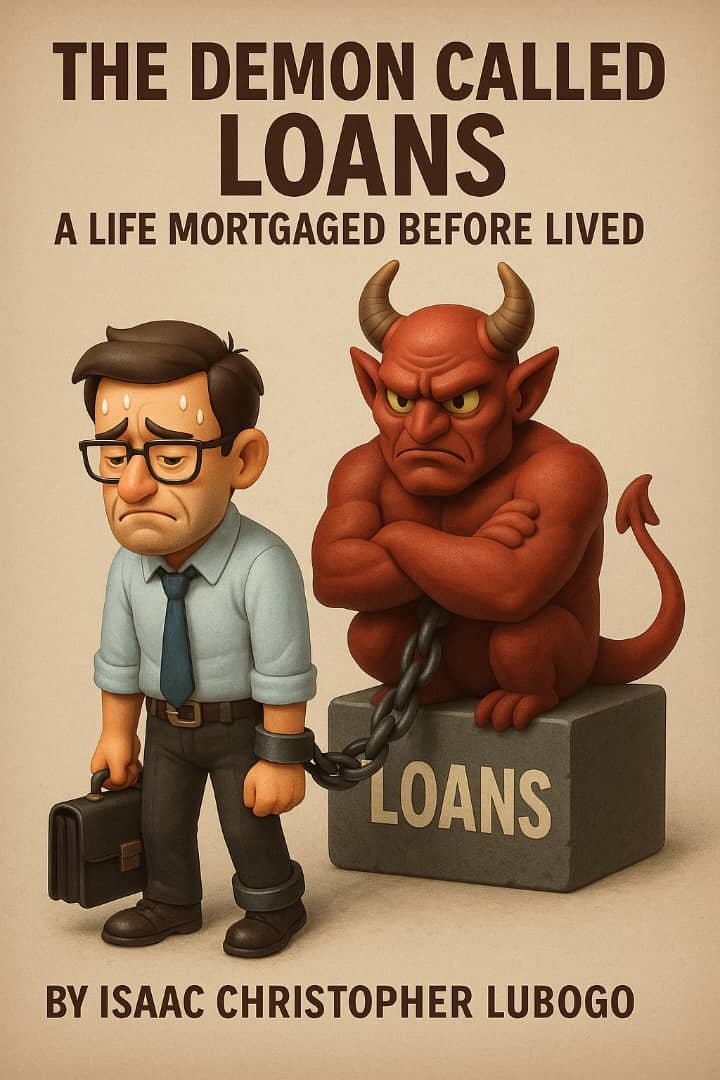By Isaac Christopher Lubogo
I. THE INVISIBLE HANDCUFFS OF THE MODERN SLAVE
We arrive at our workplaces each morning dressed in fine clothes, clutching leather briefcases, wearing polished shoes, and bearing names like “Manager,” “Supervisor,” “Executive.”
And yet—behind those titles, beneath those smiles, beneath the coffee-fueled meetings and PowerPoint presentations—are shackled souls.
Not shackled by chains, but by loans.
Loans—the invisible demon that sits on every desk, sleeps in every bedroom, eats at every dinner table.
Loans that arrive clothed as “help” but leave behind nothing but hypertension, silent tears, and a lifetime of enslavement.

II. THE MONTH THAT NEVER BEGINS
How many of us, truly, begin the month?
Not metaphorically—but economically?
We receive salaries on the 28th, and by the 29th, the bank has taken its share.
The shylock has knocked.
The SACCO has deducted.
The landlord is lurking.
The loan app has reminded.
And so, our months don’t begin—they expire in arrears.
We work not to live, but to pay.
We survive not to thrive, but to settle.
We exist not as free agents of destiny, but as slaves to obligations we no longer remember initiating.
This, my friends, is not capitalism. It is captivity.
III. THE MADNESS OF NORMALITY
It is no longer shocking to hear that someone earns 5 million shillings and goes home with 400,000.
That someone took a loan to clear a loan.
That someone borrowed to pay school fees, and again borrowed to eat, and again borrowed to repair the boda accident the son caused on the way from school.
We do not scream.
We do not riot.
We do not question.
Why?
Because madness has become normal—and normal has been institutionalized.
A man who cannot afford bread on the 5th of every month still says, “Thank God for a job.”
Is it still a job, or a polished prison?
IV. THE PHILOSOPHY OF THE MORTGAGED SOUL
Aristotle once said, “The end of labor is to gain leisure.”
But in our times, the end of labor is more labor.
For what is leisure to the man who cannot breathe without checking the loan balance on his mobile app?
What is rest to the woman whose salary is garnished even before she can greet her child with joy?
What is peace to the executive whose bank statements are a gallery of despair?
We are mortgaging our futures to escape our present, only to re-enter that same prison with new locks.
V. A SILENT HEALTH CRISIS
The blood pressure tablets.
The migraines.
The unspoken strokes.
The mysterious ulcers.
You think they are caused by age?
No, my friend.
Debt is the disease.
And the workplace loan is its most aggressive variant.
We have institutionalized stress.
We have baptized high blood pressure as “occupational hazard.”
But in truth, we are killing our people slowly—by putting price tags on their dignity, selling them dreams financed by nightmares.
VI. THE MORAL INDICTMENT
Who is to blame?
The banks, that make it so easy to borrow and so painful to repay?
The employers, who pay too little and demand too much?
The culture, that mocks simplicity and glorifies exaggerated lifestyles?
Or perhaps—it is us.
We have allowed instant gratification to become a way of life.
We have mistaken loans for liberation.
We have confused availability with affordability.
We build houses we cannot sleep in peace.
We drive cars that carry our coffin of stress.
We host weddings funded by borrowed sorrow.
VII. THE CALL TO CONSCIOUSNESS
This is not a call to shame.
It is a call to wake up.
If you are in debt, you are not alone.
But if you are in denial, you are in danger.
Let us rethink how we live.
Let us teach our children that simplicity is not failure.
That walking is not weakness.
That rice and beans are not poverty.
Let us find joy not in things, but in peace.
And let us tell this demon called loan,
“You are not my master. I will no longer work only to feed you.”
VIII. THE FINAL WORD
A wise man once said:
“Before you take a loan, count not your income—count your peace.”
For the one who loses peace in pursuit of possessions has paid a price far greater than interest.
He has paid with his soul.
And so I say:
To live within your means is not cowardice—it is wisdom.
To say no to debt is not pride—it is power.
To escape the demon called loans,
Is to return to the altar of freedom.
May we find that altar again.








